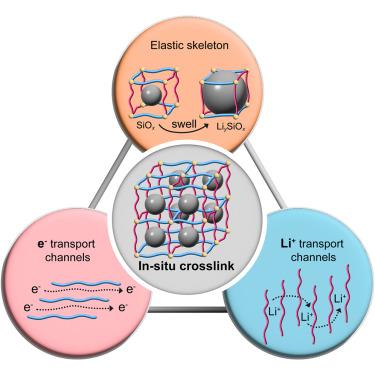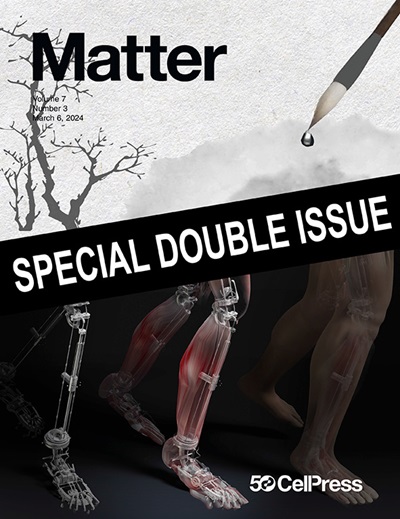通过原位交联建立弹性电子/锂离子输运网络以稳定SiOx电极的界面相
IF 17.5
1区 材料科学
Q1 MATERIALS SCIENCE, MULTIDISCIPLINARY
引用次数: 0
摘要
高容量硅基电极在循环过程中经历的显著体积波动导致导电框架的解体和固体-电解质界面(SEI)的不稳定。为了克服这些挑战,采用原位巯基烯点击反应来制造弹性电子/锂离子(e−/Li+)导电聚合物网络,该网络可以均匀结合SiOx活性材料。所提出的聚合物包含增强电子传导的刚性主链段,以及促进Li+在SiOx电极内传输和应力消散的柔性连接剂,从而稳定SiOx上的界面电荷转移。通过将SiOx电极的初始膨胀率从157%降低到65%,稳定的聚合物网络有效地减轻了循环过程中的SEI降解。因此,原位交联聚合物框架可以提高容量保持率(250次循环后达到82.7%)和速率性能。通过同时加强离子和电子的传递途径,这项工作为未来设计高容量负极提供了新的途径。本文章由计算机程序翻译,如有差异,请以英文原文为准。


Establishing an elastic electron/lithium-ion transport network via in situ crosslinking for stabilizing interphases in SiOx electrodes
The significant volumetric fluctuations experienced by high-capacity silicon-based electrodes during cycling lead to the disintegration of conductive frameworks and destabilization of the solid-electrolyte interphase (SEI). To overcome these challenges, an in situ thiol-ene click reaction is employed to fabricate an elastic electron/lithium-ion (e−/Li+)-conducting polymer network that uniformly binds SiOx active materials. The proposed polymer incorporates rigid backbone segments that enhance electron conduction, along with flexible linkers that facilitate Li+ transport and stress dissipation within the SiOx electrode, thereby stabilizing the interfacial charge transfer on SiOx. By reducing the initial expansion rate of the SiOx electrode from 157% to 65%, the stable polymeric network effectively mitigates SEI degradation during cycling. As a result, the in-situ-crosslinked polymer framework enables improved capacity retention (82.7% after 250 cycles) and rate performance. By simultaneously strengthening the ion and electron transport pathways, this work offers new avenues for the future design of high-capacity negative electrodes.
求助全文
通过发布文献求助,成功后即可免费获取论文全文。
去求助
来源期刊

Matter
MATERIALS SCIENCE, MULTIDISCIPLINARY-
CiteScore
26.30
自引率
2.60%
发文量
367
期刊介绍:
Matter, a monthly journal affiliated with Cell, spans the broad field of materials science from nano to macro levels,covering fundamentals to applications. Embracing groundbreaking technologies,it includes full-length research articles,reviews, perspectives,previews, opinions, personnel stories, and general editorial content.
Matter aims to be the primary resource for researchers in academia and industry, inspiring the next generation of materials scientists.
 求助内容:
求助内容: 应助结果提醒方式:
应助结果提醒方式:


